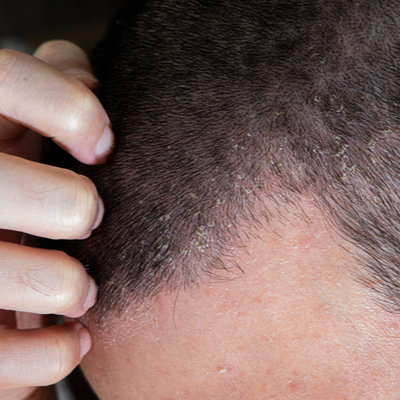 OVERVIEW
OVERVIEW
If you experience dandruff and flaky, oily patches on your back, upper chest, and face, you may have a common skin condition known as seborrheic dermatitis.
A form of dermatitis, this type of skin inflammation most frequently affects parts of your body that contain a lot of sebcaeous, or oil-producing glands. Read on to find out all about seborrheic dermatitis, including the best dermatologist-prescribed treatment options.
What is Seborrheic Dermatitis?
A skin disease that results in a rash and flaky scales, seborrheic dermatitis primarily affects your scalp and face. It’s a commonly occurring chronic condition that affects approximately 3 to 10 out of every 100 people.
Seborrheic dermatitis is non-contagious and can occur with or without the redness of your skin.
While there is no exact cause of seborrheic dermatitis, certain factors can make a person more predisposed to developing this skin disease. This can include:
- Genetics, including a family history of dermatitis
- Excess Malassezia, a common skin yeast
- Excess oil production
- Stress
- Weakened immune system
What are the Symptoms of Seborrheic Dermatitis?
Seborrheic dermatitis forms on parts of your body that contain a lot of sebaceous glands, including your scalp, eyebrows, nose creases, behind the ears, and chest. Some people may also have patches in the genital area, under the breasts, and armpits.
Common symptoms of seborrheic dermatitis include:
- Flaky scales
- Plaques spread over a large area of skin
- White or yellow in color
- Moist or oily in texture
- Burning or itchy skin
- Mild redness
How is Seborrheic Dermatitis Diagnosed?
An appointment with a board-certified dermatologist can help accurately diagnose seborrheic dermatitis since its symptoms can be visually similar to other skin conditions such as eczema and psoriasis.
Your dermatologist will evaluate your overall health history, including your family history and current symptoms of the disease. They may scrape off a skin sample to assess it under the microscope to distinguish it from other skin diseases.
Treatment for Seborrheic Dermatitis is Safe When Performed by a Board-Certified Dermatologist
Seborrheic dermatitis is a chronic skin condition that can be effectively controlled with an individualized treatment plan.
Depending on the severity of your seborrheic dermatitis, your dermatologist may prescribe one or more of the following methods of treatment:
- Topical medications
These can include antifungals, anti-inflammatories, and corticosteroids to deal with the common symptoms of seborrheic dermatitis. - Medicated shampoos
Your dermatologist may prescribe shampoos containing coal tar, ketoconazole, salicylic acid, or selenium sulfide if you have seborrheic dermatitis on your scalp. - Phytotherapy
Depending on your symptoms and treatment plan, your dermatologist may prescribe light therapy as a form of treatment—sunlight has been shown to improve seborrheic dermatitis.


